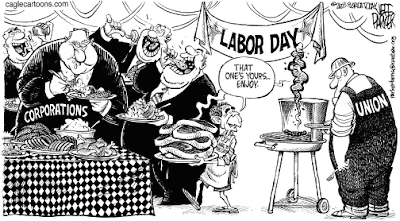


Economics, as a branch of the more general theory of human action, deals with all human action, i.e., with mans purposive aiming at the attainment of ends chosen, whatever these ends may be.--Ludwig von Mises
GDP, the broadest measure of the nation's economic activity, stood at an annual rate of 3.3% in the quarter, adjusted for inflation, the Commerce Department said.
Economic growth between 2.5% and 3.5% is typically viewed as the norm for a healthy economy.
read the CNN storyFrom David Leonhardt's NYT piece on Obamanomics:
Yet laissez-faire capitalism hasn’t delivered nearly what its proponents promised. It has created big budget deficits ...
Laissez-faire capitalism may or may not live up its proponents hopes (I think it does--or would if we actually tried it since what we see in the world around us isn't truly laissez-faire capitalism), but it certainly does not create big budget deficits. The responsibility for deficits lies with pols about whose abysmal performance there can be no doubt. Leonhardt's assertion has to rank as one of the stupidest things ever written.

 For more than two decades, colleges and universities across the country have been jacking up tuition at a faster rate than costs have risen on any other major product or service - four times faster than the overall inflation rate and faster even than increases in the price of gasoline or health care (see the chart to the right). The result: After adjusting for financial aid, the amount families pay for college has skyrocketed 439% since 1982...
For more than two decades, colleges and universities across the country have been jacking up tuition at a faster rate than costs have risen on any other major product or service - four times faster than the overall inflation rate and faster even than increases in the price of gasoline or health care (see the chart to the right). The result: After adjusting for financial aid, the amount families pay for college has skyrocketed 439% since 1982...
But let us be generous. We will not shoot them. We will not pour salt water into them, nor bury them in bedbugs, nor bridle them up into a "swan dive," nor keep them on sleepless "stand-up" for a week, nor kick them with jackboots, nor beat them with rubber truncheons, nor squeeze their skulls with iron rings, nor push them into a cell so that they lie atop one another like pieces of baggage - we will not do any of the things they did! But for the sake of our country and our children we have the duty to seek them all out and bring them all to trial! Not to put them on trial so much as their crimes. And to compel each one of them to announce loudly:
"Yes, I was an executioner and a murderer."
--The Gulag Archipelago
